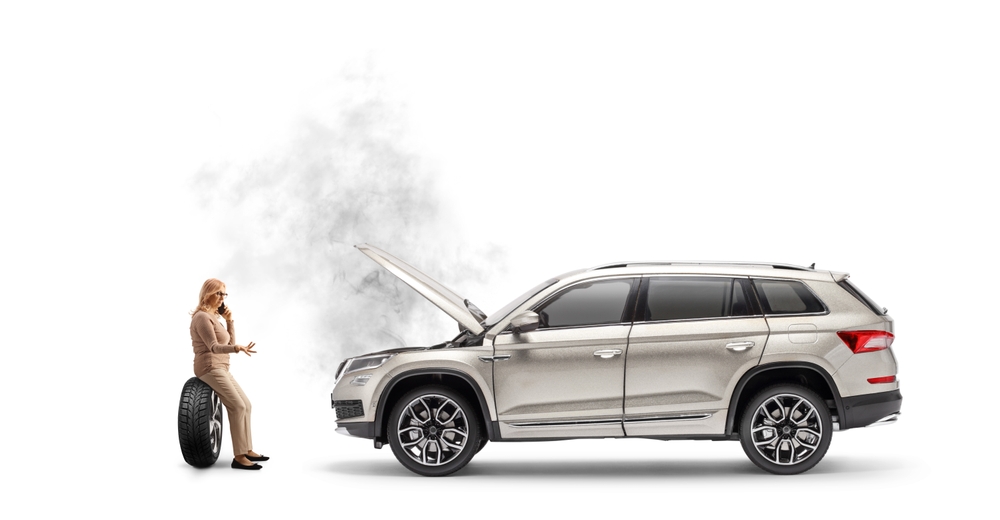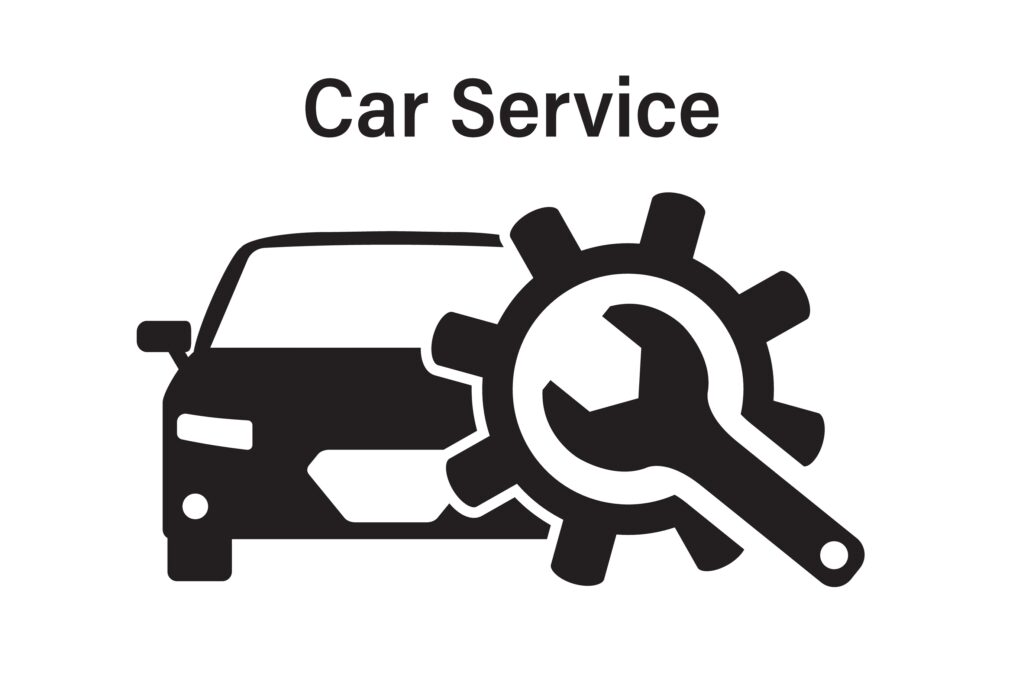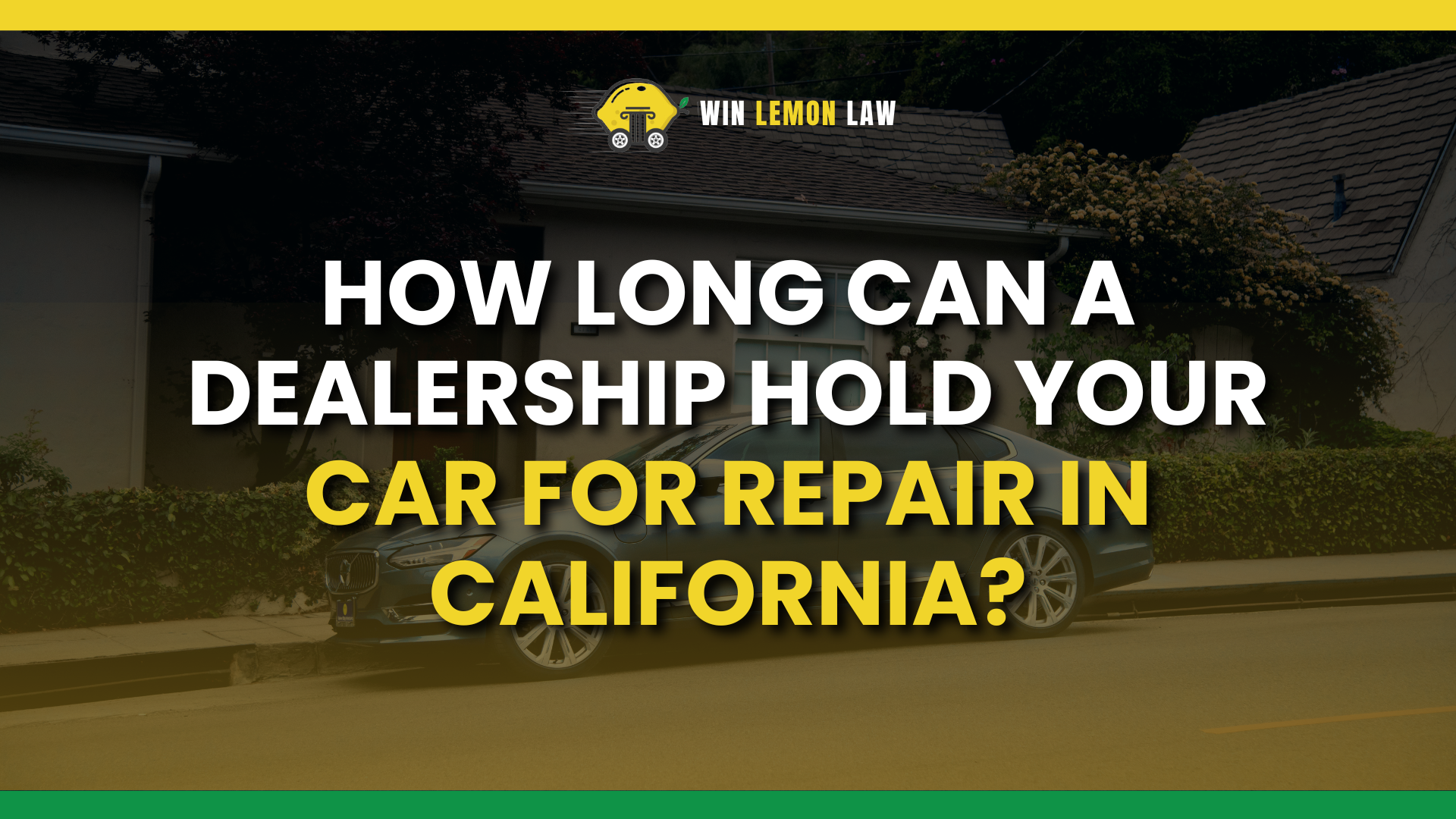When you take your car to a dealership for warranty repairs, it’s reasonable to expect a swift turnaround. However, some repairs take longer than anticipated, leaving you without your vehicle for days—or even weeks. In California, the law provides strong consumer protections to ensure dealerships don’t drag out repairs unnecessarily. If your car is out of service for too long, you may have recourse under California Lemon Law.
At Win Lemon Law, we’ve helped countless clients turn their frustration into resolution. With decades of experience and a proven track record, we ensure your rights are protected, and you receive the compensation you deserve. Whether your car has been in the shop for more than 30 days or has gone through repeated unsuccessful repairs, we’re here to guide you every step of the way.
This guide covers everything you need to know about how long a dealership can hold your car, what steps to take if delays occur, and how California Lemon Law can help. Don’t settle for endless frustration—read on to take control of your situation.

How Long Do Dealerships Typically Take to Repair Cars?
Understanding repair timelines can provide clarity as you wait for your car to be returned. On average, most repairs take 10–20 days, depending on the nature of the issue. However, complex repairs or issues requiring rare parts can extend the process significantly.
When your vehicle is under warranty, the manufacturer covers the cost of repairs, so you shouldn’t be charged. That said, dealerships often face challenges that can delay the repair process, such as:
- Parts shortages: Global supply chain disruptions, such as chip shortages, have made it harder for dealerships to source necessary parts.
- Diagnosis delays: Sometimes, pinpointing the problem takes longer than expected.
- Staff shortages: A busy dealership or limited workforce can result in long queues for service.
- Workshop capacity: Small or overbooked service departments may struggle to handle all repairs promptly.
If your repair exceeds the average timeline, it’s important to document every interaction with the dealership. Regular follow-ups and proactive communication can often prevent unnecessary delays.
California Lemon Law: How Long Is Too Long?

California Lemon Law is designed to protect consumers when their vehicles fail to meet quality and performance standards. If your car has been at the dealership for warranty repairs for more than 30 cumulative days—whether consecutive or spread out across multiple visits—you may be eligible for Lemon Law protection.
Additionally, Lemon Law applies when:
- Serious safety defects: Require two or more unsuccessful repair attempts.
- Other defects: Require four unsuccessful repair attempts.
The 30-day rule doesn’t just apply to new cars. Used cars purchased with a warranty may also qualify under California Lemon Law if the dealership cannot repair a covered defect within a reasonable timeframe. Whether your car was purchased new or used, if the repair timeline exceeds 30 days or involves repeated attempts to fix the same problem, it’s time to take action.
Serious Safety Defects: When Two Attempts Are Enough
California Lemon Law is designed to prioritize consumer safety, particularly when a vehicle has a defect that poses a significant risk to the driver, passengers, or others on the road. In cases of serious safety defects, the law allows for faster protection. Unlike other defects that may require up to four unsuccessful repair attempts, safety-related issues typically need only two unsuccessful attempts to qualify the vehicle as a lemon.
What Are Serious Safety Defects?
A safety defect is any issue that directly impacts the vehicle’s ability to operate safely. Examples include:
- Brake system failures: Problems that prevent the car from stopping properly.
- Steering malfunctions: Issues that make it difficult or impossible to control the vehicle.
- Airbag deployment failures: Defects that prevent airbags from functioning in an accident.
- Electrical problems: Malfunctions that cause the vehicle to stall unexpectedly or fail to start reliably.
- Structural issues: Faults such as defective seatbelts, doors that won’t latch, or weakened crash protection features.
These types of problems create immediate and ongoing risks to the safety of the driver, passengers, and other road users, which is why California Lemon Law provides quicker recourse.
Why Two Attempts Are Enough
The law recognizes that safety defects are more than an inconvenience—they can result in severe injuries or even fatalities if not addressed promptly. Allowing the dealership only two repair attempts ensures that these issues are prioritized and resolved without delay.
If the dealership cannot fix the safety issue within two tries, or if the defect reoccurs despite repairs, the vehicle is considered unfit for use under the law. At this point, the manufacturer is required to replace the vehicle, buy it back, or provide appropriate compensation to the owner.
What Should You Do If the Dealership Holds Your Car for More Than 30 Days?
If your car has been in the shop for an extended period, the delay can be frustrating and disruptive. California law provides steps you can take to address the issue and ensure your rights are upheld:
- Contact the dealership: Speak with the service manager to get a clear explanation of the delay. Sometimes, a simple conversation can resolve the issue or expedite repairs.
- Request written updates: Ask for written documentation detailing the status of your repair, the reason for the delay, and the estimated completion date.
- Review your warranty terms: Confirm that the repair is covered under your vehicle’s warranty, and understand your rights if repairs are delayed.
- Document everything: Keep detailed records of all communications, repair orders, and timelines. This documentation can be crucial if you decide to file a Lemon Law claim.
- Escalate to the manufacturer: If the dealership is unresponsive, contact the vehicle manufacturer directly. They may intervene to resolve the delay.
- Consult a Lemon Law attorney: If all else fails, seek legal counsel. An experienced Lemon Law attorney can assess your situation, help file a claim, and ensure you receive compensation.
Taking action early can help minimize further delays and strengthen your case if legal intervention becomes necessary.
Proactive Steps to Minimize Repair Delay
While repair delays aren’t always avoidable, proactive measures can help you stay ahead of potential issues. Here’s what you can do to minimize downtime and ensure a smoother repair process:
- Choose a reputable dealership: Research service reviews before taking your car in. A dealership with a reputation for efficient repairs can save you significant time and hassle.
- Communicate clearly: Provide detailed information about the issue. Photos or videos of the defect can help technicians diagnose the problem more quickly.
- Request updates: Ask for an estimated timeline and follow up regularly to ensure progress is being made.
- Document all communications: Keep a record of emails, phone calls, and repair orders. Having everything in writing can help protect you if delays occur.
- Maintain your car: Stay on top of regular maintenance to reduce the likelihood of unexpected breakdowns requiring major repairs.
By taking these steps, you can ensure that you’re proactive and well-prepared in case delays arise.
When Should You Contact a Lemon Law Attorney?
If your vehicle has been out of service for an extended period or the dealership has made multiple unsuccessful repair attempts, it’s time to consider legal action. Many consumers hesitate to seek help, thinking the process is too complicated or costly. However, at Win Lemon Law, we make the process simple and risk-free.
Here’s when to contact a Lemon Law attorney:
- Your car has been in the shop for 30+ days for the same defect.
- You’ve made multiple trips to the dealership for the same issue without resolution.
- The defect poses a serious safety risk and hasn’t been fixed after two attempts.
- The dealership or manufacturer has been unresponsive or refuses to address your concerns.
California Lemon Law ensures that you don’t bear the financial burden of a defective vehicle. If your car qualifies as a lemon, you may be entitled to a refund, replacement, or cash compensation. Additionally, under California law, manufacturers are required to pay for your attorney’s fees, meaning you pay nothing out of pocket.
Conclusion: Don’t Let Repair Delays Disrupt Your Life
If your vehicle has been stuck at the dealership for an extended period or you’re dealing with repeated repair attempts without resolution, you may be dealing with a lemon. Don’t let the stress of ongoing repairs and the uncertainty of when—or if—you’ll get your car back overwhelm you. At Win Lemon Law, we are committed to standing by your side and guiding you through every step of the legal process.
We understand how frustrating and disruptive these situations can be, and that’s why we’re here to make it as easy as possible for you to take action. Whether your car has been out of service for more than 30 days or hasn’t been repaired despite multiple attempts, our experienced attorneys are ready to fight for your rights and secure the compensation you deserve.
Best of all, you won’t have to worry about any out-of-pocket expenses. Under California Lemon Law, the manufacturer is required to cover all legal fees if we win your case. Even if your case is unsuccessful, you still won’t owe us anything—because we believe that everyone deserves access to justice.
Contact Win Lemon Law Today
Don’t let a dealership’s delays or a defective vehicle continue to disrupt your life. Contact Win Lemon Law today for a free consultation. Our knowledgeable team is here to help you understand your rights and take action to secure the outcome you deserve.
You don’t have to face this challenge alone—let us fight for you, so you can get back on the road with confidence and peace of mind.

